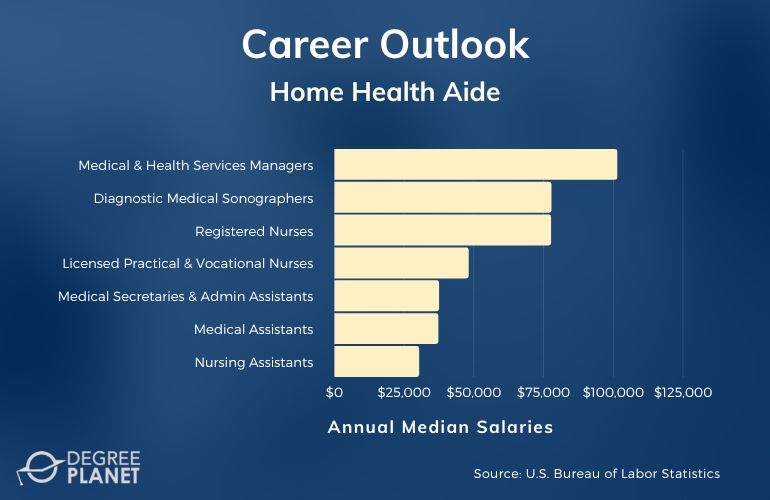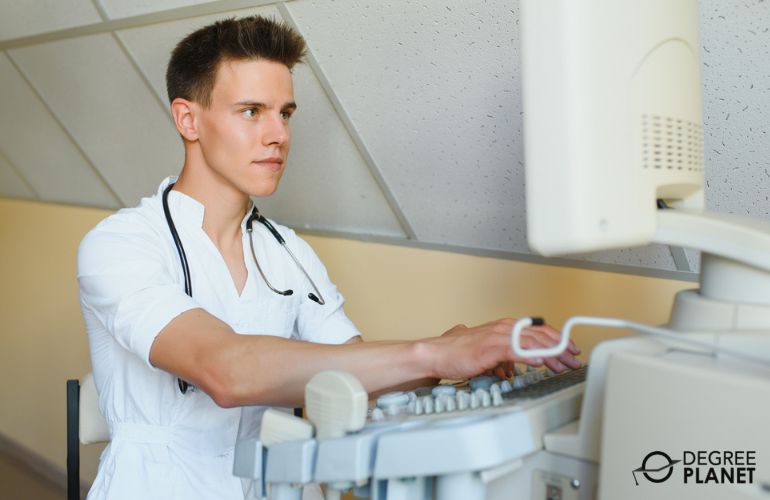Home health aide training could help you begin a fulfilling career as someone who provides essential services for the elderly or others in need of care.

As a home health aide, you could provide companionship, help people with everyday tasks, and offer some medical support. You may be able to pursue your home health aide certification online by taking distance courses with interactive elements and innovative training modules.
Editorial Listing ShortCode:
You could complete your program ready to pursue the next step toward a meaningful role as a home healthcare provider.
Online Home Health Aide Training Programs

Sometimes, people need extra help with their health and personal care, but they’re not in bad enough shape to warrant a hospital stay. They may be elderly, disabled, or recovering from surgery. With assistance, they could stay at home or in a residential facility.
Home health aides can provide the help those people need. Also known as an HHA, a home health aide is a healthcare professional who helps with basic tasks. That can include bathing and food preparation. In some cases, it may also involve wound care or medication administration.
Editorial Listing ShortCode:
Rules about what HHAs can do vary by state. If you want to work as a home health aide, it’s beneficial to get official training. By completing an accredited HHA certificate program, you can feel confident that you’ll know how to help the people in your care. Potential employers will have more confidence in you, too.
This type of undergraduate certificate program might cover:
- Bathing
- Communication
- Confidentiality
- Medical terms
- Medication
- Nutrition
- Oral care
- Record management
Many HHA training programs lead to certification. When you complete the program, you may receive a diploma or a certificate from the school. In some states, there’s also certification or licensure administered by a state board. A certified home health aide (CHHA) may have employment opportunities with home health agencies or assisted-living facilities.
Home Health Aide Careers & Salaries

Completing an HHA program could help you qualify for a job as a home health aide. In that role, your responsibilities could include helping clients with daily living tasks, administering medication, and recording vital signs.
Home health aides often might work for a home health service and deliver care to clients in their houses. They could spend all day with one patient or visit several clients each day. Other jobs for health aides may be available in group homes or social service agencies.
Working as a personal care aide (PCA) is a similar job. PCAs help with everyday tasks, such as feeding, dressing, housekeeping, and errands. Your home health skills could also make you a fitting candidate for a job as an orderly, a psychiatric technician, or a medical secretary. You might need a bit of on-the-job training specific to the new role.
According to the Bureau of Labor Statistics, the median annual salary for healthcare support roles is $29,880.
| Careers | Annual Median Salaries |
| Medical and Health Services Managers | $101,340 |
| Diagnostic Medical Sonographers | $77,740 |
| Registered Nurses | $77,600 |
| Licensed Practical and Licensed Vocational Nurses | $48,070 |
| Medical Secretaries and Administrative Assistants | $37,450 |
| Medical Assistants | $37,190 |
| Nursing Assistants | $30,310 |
| Psychiatric Aides | $30,260 |
| Orderlies | $29,990 |
| Home Health and Personal Care Aides | $29,430 |
Becoming a home health aide could be the first step in a successful healthcare career. HHA school can serve as a foundation for additional healthcare education.
By going back to school, you could prepare for a more advanced position in the medical field. Becoming a certified nursing assistant (CNA) is a top choice. CNAs can take on more healthcare responsibilities than HHAs. They often work in hospitals and group homes.
Editorial Listing ShortCode:
With a college program of 2 years or less, you might qualify to work as a medical assistant, an ultrasound technician, or a licensed practical nurse (LPN). Becoming a registered nurse (RN) often requires a bachelor degree, though some can enter the role with an associates.
Getting a bachelor’s degree could also help you qualify you for management roles, perhaps as the director of a home health agency.
Home Health Certificate Curriculum & Courses

In a home health program, you’ll learn about how to care for clients and conduct yourself as a healthcare professional. Your program might contain courses similar to the following:
- Aging Process: You’ll learn what happens in the mind and body as people get older, and you’ll also prepare to lend assistance to older adults.
- Anatomy and Physiology: An A&P class will teach you about the systems of the body and various diseases and injuries that can affect them.
- Clinical Experience: During a hands-on internship, you’ll get to practice your home health skills in a real-world setting.
- Communication: There may be a course that teaches you how to communicate well with patients and their loved ones.
- Food and Nutrition: This class will focus on the importance of good nutrition and helping clients get the food they need.
- Health, Safety, and Home Care: You can acquire grooming, first aid, and housekeeping skills in this class.
- Home Health Professionalism: Your program may include an overview of professional conduct as well as home health career options.
- Law and Ethics: You’ll discuss legal and ethical issues in healthcare, especially ones pertaining to patient privacy.
- Medical Terminology: As a healthcare provider, it will be important for you to know basic medical terms and how to abbreviate them.
- Medication: You’ll study different types of drugs and also learn how to administer them.
Different schools structure home health training in different ways. Your curriculum might be divided into several shorter courses or just a few longer ones.
How to Become a Certified Home Health Aide

Not all home health agencies require employees to be certified. Even still, certification could potentially make you a more in-demand hire. Also, organizations that receive Medicare and Medicaid funding are held to certain standards about hiring certified employees. Those agencies sometimes pay higher wages, so your certification efforts might even pay off financially.
Here’s a general idea of the necessary steps to become a certified home health aide:
- Hold a high school diploma or a GED.
- Complete a home health training program, preferably from an accredited school.
- Gain hands-on experience by completing clinical hours in a supervised work setting.
- Pass an exam that demonstrates your knowledge of home health practices.
- Receive a diploma or a certificate of completion from your school.
- Apply for state CHHA certification or licensure (if required by your state’s regulations).
The rules about training, clinical hours, and licensure can vary greatly from one state to another. Home health aides’ responsibilities are different from state to state too.
HHA Certificate Admissions Requirements

Home health aide schools screen potential students to make sure they are ready for the training program. A school may ask you for the following items:
- Application form
- Proof of high school completion
- School transcripts
- Test scores, such as ACT or SAT (not required by all programs)
Before you can begin your classes, you might be asked to pass several health prerequisites. That could include getting a physical exam, being up-to-date on vaccinations, and taking a TB test. You might also be required to undergo a background check or complete CPR certification.
HHA Programs Accreditation

Many organizations offer home health training. For your schooling, it’s beneficial to select a program offered through a regionally accredited college. Community colleges with regional accreditation are often strategic options to explore.
While it’s possible to earn a certificate through unaccredited classes, it’s unlikely that your coursework will transfer into any other programs, such as an integrative health degree online or a health services degree online or on campus. Regionally accredited classes, on the other hand, may apply toward additional college certificates or degrees.
Editorial Listing ShortCode:
For example, you might eventually want to pursue a more advanced healthcare path, such as enrolling in CNA school. Some of your accredited HHA coursework may count toward a new certificate program.
Home Health Aide Licensure and Certifications

Some home health aides have only on-the-job training. While that’s sufficient in some states, it’s not enough everywhere. Plus, official training and certification can help you offer the best possible care for your clients.
Medicare- and Medicaid-funded agencies must hire certified caregivers. National standards require at least 75 hours of preparation, including at least 16 hours of supervised clinical practice. Some states set standards that exceed the national requirements.
An HHA certificate from your training school may be all that’s needed for getting hired where you live. In some places, though, a certification or license from the state is also required.
Financial Aid and Scholarships

Government financial aid is available for some students in career training programs. Your accredited home health aide studies may qualify, but you’ll often be required to carry a minimum course load per semester to use government aid.
To get started with federal loans or grants, you can fill out the Free Application for Federal Student Aid (FAFSA). This form might also help you secure state assistance. Scholarships are another way to fund your education. A college may have scholarship opportunities, especially for its home health students. Local and national organizations offer scholarship programs, too.
Many workplaces even help students get a college education. Employer assistance might cover part or all of your HHA tuition. If you need help figuring out how to pay for school, you could talk to someone in your college’s financial aid department.
What Is a Home Health Aide Training Program?

A home health aide (HHA) training program is a short-term career program that teaches students how to work in the home health field.
It covers topics like basic medical care, human physiology, patient communication, housekeeping, nutrition, and record maintenance. This type of program often includes lab sessions and clinical experiences, both of which could help you gain skills and confidence.
When you complete the program, you may qualify to receive a CHHA certificate that shows you’re a trained and certified home health aide. That could help you secure employment through a home care agency or in a residential facility.
What Can You Do with a Home Health Aide Training Certificate?

As a certified home health aide, you could apply for a job in the growing field of home health services. Many health aides are employed by family services or home healthcare agencies. Others work in nursing or residential facilities.
Your HHA schooling might also make you a potential candidate for a job as a personal care aide. Working as an orderly in a hospital could be another option. With some on-the-job training, you could also pursue work as a psychiatric aide or a medical secretary.
How Long Is a Home Health Aide Training Program Online?

To meet federal standards, a home health aide training program must be at least 75 hours long. That includes programs that are offered online. At least 16 of the hours should be devoted to clinical experiences in real-world work settings.
If you enroll in a program that meets the minimum standards, you may spend several months completing the requirements. Some online undergraduate certificate programs take students an average of 4 months to complete with full-time enrollment.
Editorial Listing ShortCode:
Other online HHA programs are more comprehensive. They include extra coursework and clinical experiences to help students be as prepared as possible. Such programs may take 13 to 16 months.
What’s the Difference Between an HHA vs. CNA?
If you want a job that involves helping people, you could consider becoming a home health aide (HHA) or a certified nursing assistant (CNA).
Here are some ways these jobs compare.
| Home Health Aide | Certified Nursing Assistant |
|
|
According to the Bureau of Labor Statistics, nursing assistants typically earn more than home health aides.
Is a Home Health Aide Online Training Certificate Worth It?

Yes, a home health aide online training certificate is worth it for many students. According to the Bureau of Labor Statistics, job openings for home health and personal care aides may increase by 25% over the next ten years.
Editorial Listing ShortCode:
Official training could help you get started in this greatly in-demand field. Plus, this can be a fulfilling line of work. You would have opportunities to get to know your clients and their families. You could also make a real difference in people’s lives as you support their personal and medical needs.
Universities Offering Online Certificate in Home Health Aide Training Program
Methodology: The following school list is in alphabetical order. To be included, a college or university must be regionally accredited and offer degree programs online or in a hybrid format.

Auburn University offers a Home Health Aide Certification. This program may be an excellent next step for students passionate about working with elderly, disabled, or ill populations. All classes meet online and are complemented by hands-on clinical practice in the field. On average, students can complete the certificate requirements in 4 to 6 months.
Auburn University is accredited by the Southern Association of Colleges and Schools Commission on Colleges.

City College of New York offers a Certified Home Health Aide training program. The curriculum aims to prepare students to support their clients with activities like housekeeping, bathing, dressing, and meal preparation. Students attend classes using a hybrid online and in-person learning model. Many graduates work in private homes, home care agencies, and other long-term care settings.
CCNY is accredited by the Middle States Commission on Higher Education.

City College of San Francisco offers a Certificate for Home Health Aides and Nurse Assistants. This program seeks to equip students with the skills needed to excel in entry-level care positions. Classes are housed fully online. The curriculum consists of courses such as Introduction to Acute Care, Convalescent Care, and The Home Health Aide Profession.
City College of San Francisco is accredited by the Accrediting Commission for Community and Junior Colleges, the Western Association of Schools and Colleges.

Drake State Community and Technical College offers healthcare certificates. Students can specialize as medical assistants, certified nursing assistants, medication assistants, patient care technicians, or phlebotomy technicians. The program has the flexibility of online, in-person, or hybrid attendance. Incoming students are admitted three times each year.
Drake State Community and Technical College is accredited by the Southern Association of Colleges and Schools Commission on Colleges.

Florida State College at Jacksonville offers training certificates for nurse aides, CPR instruction, basic healthcare workers, and advanced home health aides. Students typically need to devote at least 315 hours of class time to complete their certification. All learning materials can be accessed 100% online.
Florida State College at Jacksonville is accredited by the Southern Association of Colleges and Schools Commission on Colleges.

Johnson County Community College offers a Certified Nurse Aide program. This program may be ideal for students pursuing diverse entry-level roles in healthcare. The curriculum is designed to teach students broad care skills, including infection control, patient communication, hygiene support, and vital signs reporting. Students are required to complete the program’s coursework online and clinical rotations in the field.
JCCC is accredited by the Higher Learning Commission.

Oakton Community College offers a Certificate in Basic Nurse Assistant Training. Graduates may pursue fulfilling entry-level positions in settings like long-term care, home health, hospitals, and rehabilitation centers. The program requires the completion of 8 credit hours. Students can select in-person, online, or hybrid class formats to best meet their needs.
Oakton Community College is accredited by the Higher Learning Commission.

Quincy College offers a non-credit Certificate for Home Health Aide training program. The program is housed in a convenient online format for busy working professionals. To earn the certificate, students must complete a minimum of 120 class hours. Classes cover core concepts like human development, safety and body mechanics, ambulation, infection prevention, hospice, nutrition, and mental health support.
Quincy College is accredited by the New England Commission of Higher Education.

Sacred Heart University offers an online program for a Certificate in Home Health Care Management. This program is designed for non-baccalaureate prepared nurses who need to meet state training requirements. The curriculum spans two courses and six credit hours. Upon completion, these credits can potentially be applied to a future Bachelor of Science in Nursing.
Sacred Heart University is accredited by the New England Commission of Higher Education.
Getting Your Home Health Aide Training Certificate Online

Many people need a hand with their home, grooming, and healthcare needs. As a home health aide, you could provide valuable companionship, housekeeping, and healthcare services for your clients. It can be a rewarding job that offers opportunities to help others.
To begin your home health career, you could enroll in a certificate training program. Education in this sector could qualify you for a home health certification. You can even take online classes for your CHHA training. Choosing an accredited school ensures that you’ll get a quality education.
The sooner you give online HHA programs a look, the sooner you may find the one that’s right for you.

